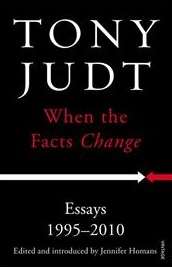When the Facts Change (Essays 1995-2010)

Editorial Random House UK
Fecha de edición octubre 2015 · Edición nº 1
Idioma inglés
EAN 9780099593430
400 páginas
Libro
encuadernado en tapa blanda
Resumen del libro
This is a great thinker's final testament: a characteristically wise and forthright collection of essays from the author of Postwar and Thinking the Twentieth Century, spanning a career of extraordinary intellectual engagement. Edited and introduced by Jennifer Homans. Tony Judt's first collection of essays, Reappraisals, was centred on twentieth-century Europe in history and memory.
Some of Judt's most prominent and indeed controversial essays felt outside of the scope of Reappraisals, most notably his writings on the state of Israel and its relationship to Palestine. There would be time, it was thought, to fit these essays into a larger frame. Sadly, this would not be the case, at least during the author's own life.
Now, in When the Facts Change, Tony Judt's widow and fellow historian, Jennifer Homans, has found the frame, gathering together important essays from the span of Judt's career that chronicle both the evolution of his thought and the remarkable consistency of his passionate engagement and intellectual elan. Whether the subject is the scholarly poverty of the new social history, the willful blindness of French collective memory about what happened to the country's Jews during World War II, or the moral challenge to Israel of the so-called Palestinian problem, the majesty of Tony Judt's work lies in his combination of unsparing honesty, intellectual brilliance, and ethical clarity. When the Facts Change exemplifies the utility, indeed the necessity, of minding our history and not letting cheerful fictions suffice in its place.
An emphatic demonstration of the power of a great historian to connect us more deeply to the world as it was, as it is, and as it should be, it is a fitting capstone to an extraordinary body of work.
Biografía del autor
x{0026}lt;P x{0026}lt;B Tony Judt x{0026}lt;/B (Londres, 1948-Nueva York, 2010) realizó sus estudios en el King's College de Cambridge y en la École Normale Supérieure de París. Impartió clases en las universidades de Cambridge, Oxford, Berkeley y Nueva York, y en esta última ocupó la cátedra de Estudios Europeos, que él mismo fundó en 1995, y fue director del Remarque Institute. Entre sus publicaciones cabe destacar x{0026}lt;I El peso de la responsabilidadx{0026}lt;/I (Taurus, 2014), x{0026}lt;I ¿Una gran ilusión?x{0026}lt;/I (Taurus, 2013), x{0026}lt;I Pensar el siglo XXx{0026}lt;/I (Taurus, 2012), x{0026}lt;I El refugio de la memoriax{0026}lt;/I (Taurus, 2011), x{0026}lt;I Algo va malx{0026}lt;/I (Taurus, 2010), x{0026}lt;I Sobre el olvidado siglo XX x{0026}lt;/I (Taurus, 2008), x{0026}lt;I Pasado imperfectox{0026}lt;/I (Taurus, 2007), x{0026}lt;I Postguerrax{0026}lt;/I (Taurus, 2006), considerado uno de los diez mejores libros de 2005 por la x{0026}lt;I New York Times Book Reviewx{0026}lt;/I , galardonado con el Premio Council on Foreign Relations Arthur Ross y finalista del premio Pulitzer, y x{0026}lt;I Cuando los hechos cambianx{0026}lt;/I (Taurus, 2015). Judt colaboró en diferentes medios de Europa y Estados Unidos, como x{0026}lt;I The New York Review of Booksx{0026}lt;/I , el x{0026}lt;I Times Literary Supplementx{0026}lt;/I o x{0026}lt;I The New York Timesx{0026}lt;/I . En 2007 recibió el Premio Hannah Arendt, y en 2009 el Orwell Prize for Lifetime Achievement. Falleció en agosto de 2010 a causa de una enfermedad degenerativa.x{0026}lt;/P








